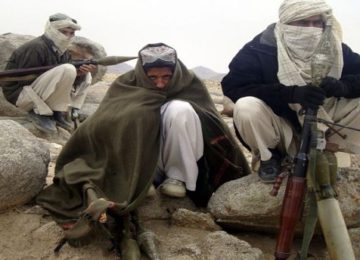The South Asian region is significant in China’s priority list since its border is linked to almost all nations in the region. China is also worried about its national security and the threat of an uprising by the East Turkistan Islamic Movement (ETIM) in its western Xinjiang province. That is why China wants to establish a military base in Badakhshan province of Afghanistan, however, the Afghan government has rejected the proposal.
A peaceful and stable Afghanistan is in China’s best interests, which would ensure its economic ventures and security environment. It is also irked by the partnership of India and United States (US); with both strategic allies expanding their presence in the Indian Ocean to keep an eye on China.
In 2012 and 2013, Beijing allocated $240 million for Kabul for development purposes. At present, dozens of Chinese companies get deeply involved in the economic reconstruction of Afghanistan. For instance, Metallurgical Corporation of China (MCC) won the offer of Mes Aynak Copper mine in 2007. As per the agreement, amongst MCC and Afghanistan government, MCC will pay in excess of 800 million US dollars for lease of the copper mine and will pay 60 million US dollars each year under tax.
Other than that, MCC likewise guarantees to build schools, mosques, streets, medical facilities, railroad, along with a press plant. It also agreed to employ as many local workers as possible. Thus, China is trying to facilitate the advancement of Afghan economy through enhancing bilateral trade and providing more job opportunities. Just like China, if the international community also focuses more on boosting the Afghan economy rather than spending tirelessly on military solutions, it could go a long way in eradicating militancy.
China has also allocated approximately one billion US dollars in aid to the Afghan government since 2001, which, while not sufficient, has greatly helped the Afghan government in tackling its crises. The Chinese government additionally offers specialized training to Afghans in different fields and areas. From 2007 to 2008, the Chinese government offered 10 short-term training courses to Afghans, including diplomacy, human resource management, leadership, project management, hospital management, government fiscal, financial management, economic management, public administration as well as other multidisciplinary fields.
China also became a key member to the Quadrilateral Coordinating group (QCG) in 2015, which was brokered by Pakistan. Other members included US and Afghanistan. However the death of Mullah Omer confirmed by Afghan government led to the collapse of the second round of Taliban-Afghan Government peace talks.
In 2013, Pakistan also initiated a trilateral forum with China and Russia. These three regional countries are concerned about the US presence in Afghanistan and the growing presence of the ISIS in Afghanistan. All three parties agreed to facilitate an Afghan-led, Afghan-owned peace and reconciliation process. The trilateral arrangement has further expanded to regional countries stakeholders namely India, Iran, and Central Asian Republics (CARs). In April 2015, a meeting was held in Moscow in this regard but the US refused to take part for various reasons.
“China, Afghanistan and Pakistan, as three neighbors, will naturally try to strengthen cooperation amongst each other,” Former Chinese diplomat and foreign minister Wang Yi was quoted by China Central Television (CCTV). “This is fully in accordance with our common interests, and is a good thing for us.” Likewise, Du Youkang, the Director of the South Asia Studies Center at Fudan University in Shanghai said “Bombings have never stopped, even in the capital. Afghanistan shares a border with China, so in this case China must get involved to promote the talks and to secure the stability in the region.”
According to Afghan experts, Chinese officials are striving to keep the situation in Pakistan and Afghanistan under control, so that Beijing can implement its economic projects and protect its investments. China’s primary goal for its increased involvement in the Afghan peace process is to secure its economic interests in the country and the region. “We hope the relevant U.S. policies can help promote the security, stability and development of Afghanistan and the region,” Hua Chunying, spokeswoman of China’s Foreign Ministry also added regarding the US role.
The Afghan government stresses on an Afghan-led peace process, while Taliban demand the withdrawal of US troops before talks can take place. They also reject the Afghan constitution accusing it of being imposed by the foreigners. China’s ongoing extended commitment to Afghanistan and Pakistan in regard to territorial security issues certainly comes naturally, as the NATO coalition withdraws much of its presence from Afghanistan.
Peace in South Asia and different regions is linked to peace in Afghanistan. It is time stakeholders realize this and come together in supporting an Afghan-led peace and reconciliation process, keeping Taliban on the negotiating table.
Ehtesham Zafar is a research intern at the Center for Research and Security Studies (CRSS). He is currently enrolled in BS International Relations at NUML, Islamabad.







